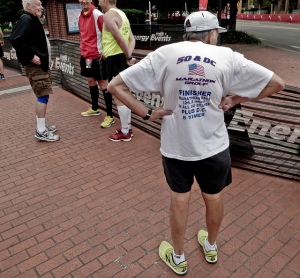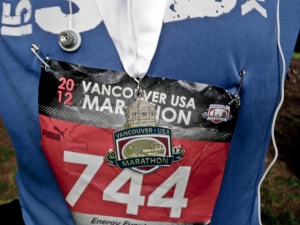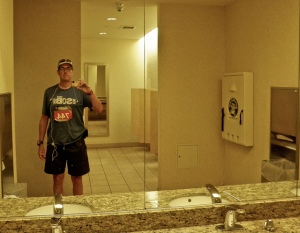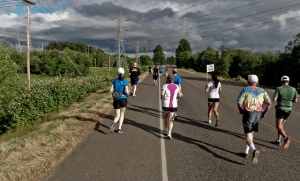Not my first marathon, of course, I think it was my fourteenth marathon, and maybe not even my first marathon in a fib.
I should really re-title this as something about running my first marathon when I KNEW I was in atrial fibrillation. I recall one particular marathon, a couple of years ago, where I started out great and after twenty miles I totally fell to pieces. I would have quit if it hadn’t been a trail marathon with no easy way to DNF – I still had to get to the finish line. In retrospect I realize this was not “hitting the wall,” which I don’t generally tend to do, but I’m pretty sure I went into atrial fibrillation at that point. I don’t mind suffering but that was absurd. It was like eating your favorite food and inexplicably finding it tastes like $&!T.
That was before I even knew I was going into a fib, and I was probably still going in and out of a fib – but ever since May 12, 2012 I have been in persistent atrial fibrillation (meaning that I am always in a fib and have no expectation of NOT being in a fib).

Lining Up At The Back For This One
In May of 2012 I was actually training for my first 50K (31 mile) race (Bighorn Mountain Wild and Scenic Trail Run, Buffalo, Wyoming) and I had been doing a lot of long runs – looking at my training log I see that I had already done six twenty-milers during my training for that race.
I asked my electrophysiologist, who I hadn’t yet seen for my appointment, if I could run the 50K and he said I shouldn’t; so I was effectively grounded as far as the 50K was concerned.
But being the incorrigible distance runner that I am I rationalized, “Well I didn’t specifically ask about running a regular marathon. I‘ve been running 50-60 miles per week for a couple of months – I sure wouldn’t want to waste all that training, would I?”
I looked at the online marathon calendars and discovered that there was a regular marathon (26.2 miles) that same weekend, and only a five hour drive – the Vancouver USA Marathon in Vancouver, Washington – just across the river from Portland, Oregon.
I admit that I was scared – this was unknown territory – running a marathon while in atrial fibrillation. Would I be able to complete it? Would I drop dead? Would I suffer like an animal, I mean, would I suffer even more than running a regular marathon?
In a lot of ways the course for the Vancouver event was a lot safer than the Wyoming event. The Bighorn was up and down remote canyons in the Rocky Mountains whereas the Vancouver USA was a flat course through the suburbs of Portland. If I needed to drop out of the race, or if I needed medical assistance, that would be simple – go ring a doorbell.
But naturally I was still nervous when I started out. My plan was just to get through it. I decided not to try to beat anybody, to keep it slow and steady, and to walk up the few little hills that were part of the course.

Marathons In All 50 States – EIGHT TIMES!!!!!
As stated previously the experience of being in persistent atrial fibrillation is different than that of going in and out of a fib. Persistent a fib isn’t as bad. I’m slower but stable. People who suddenly go into a fib in the middle of a race often find themselves unable to continue – it can be devastating. I know – I think it has happened to me (see above).
At any rate – I started running with the eleven minute mile pace group and hung out with them for most of the race. Eventually I realized that running this race in atrial fibrillation wasn’t that much different than any other marathon that I have done – except for being a bit slower. When I was into the final miles I was surprised that I felt fine – clearly much better than the race described above. I think my plan of keeping it slow and walking the one or two hills worked out – I had very little suffering.
Crossing the finish line was an emotional experience and even though I was there all alone I broke out in sobbing tears. Tears of joy, I guess, because I had finished the marathon and I hadn’t died! It really was just about like normal and I started wondering – just how many of these things had I done in fib?

Large Man Crying At Finish Line
If you’re a runner in atrial fibrillation and you are reading this I want to make sure that you realize that I am NOT saying, “Go run a marathon in atrial fibrillation.” I am simply relating my personal experience. I am just one individual and, naturally, your experience is different. I stress that it is important that you agree with your cardiologist regarding running and atrial fibrillation. This blog is just my personal story – it isn’t peer reviewed and I am not a cardiologist.
By the way when I finally saw my electrophysiologist he cleared me to continue running and did go on to complete my first 50K four months after the Vancouver USA Marathon. At this point I am comfortable with distance running in atrial fibrillation and am not (too) afraid of dying out there – but that first marathon in (known) atrial fibrillation – well – that was huge.
My next event, incidentally, is the Bizz Johnson 50K in October.



Yeesh, I think I would have quit running altogether. Great job!
Thanks Danny – I know you wouldn’t quit – you’d do precisely the same thing!
I remember running the Carlsbad Half Marathon with undiagnosed atrial flutter. It didn’t kick in until mile 10 or so, but I was completely mystified. I couldn’t catch my breath, my legs felt like lead, I couldn’t run further than 100 yards at a time. I knew it wasn’t fatigue – but I didn’t know what it could be. Heart attack? Imminent death? What misery.
We finally got it under control with meds and then surgery and I was able to keep running without gassing out within a mile. Now it’s become a fib, but not persistent.
I’m not sure how you do it with persistent a fib, but I’m glad you found a way to deal with it. Keep on keeping on!
BTW, do you use a heart rate monitor? How does it help?
Danny I have been running since the early 70ies. I have done numerous ultras (including Bad Water) In the last few years my pace has dramatically slowed. My GD MD discovered AF. That explained the dramatic change. My best 100 mile race walk was just over 20 hours. Now i can not maintain 12min pace for a 10 miler. I went through the cardiovascular Riga-morro the heart is wide open but it is all electrical malfunction. The MDs are confused as I do not exhibit symptoms other than a really low heart rate and running a slow pace. Bad Water (Death Valley to My whitney 36 hours) was tiring physically but no strain on my cardio.
The Rx advised has done nothing but slow me down, cause early fatigue and some slight buzzing in my ears. No discernible improvement in the A Fib dept.
The advice from the big boys, loose weight (5’11” 149 lbs) use less sodium ( not for years have I) exercise more. This last advice was just after running (slogging) a 50k. Ablation is very sketchy as I have companions that followed that path and all have had several ablations with minimal to no improvement.
Regards Trail Dale
Way to Go!!!
Since 1983 I’ve run/jogged 59 full marathons and have suffered with A-fib on and off for the last 12 years. I’ve finished the Boston (2001 in 3:23) and NY City (2005 in 4:15) marathons while in constant A-fib while carefully monitoring my heart rate. My cardiologists encouraged me to run marathons and also triathlons. One cardiologist told me that my heart is so strong that it laughs at A-fib and that I have the heart of an olympic cyclist. For the first 6 months of this year my heart was in constant A-fib that no dugs or multiple cardioversions could put it back into normal sinus rhythm. On July 9, 2013 I had the “Wolf Mini-Maze” (at the International A-fib Center of Excellence in Indianapolis) operation done on my heart. It was a great success and my heart has been in constant normal rhythm ever since (nearly 6 months now and I’m not taking and medications). In the Mini-Maze they removed my Left Atrial Appendage (LAA) so that if my heart ever goes back into constant A-fib I will NOT meed anticoagulant therapy. As you likely know life threatening blood clots tend to form in the LAA when your heart is in constant A-fib. The risk of stroke over the life time of an A-fib patient is huge. 3 out of 5 A-fib patients will suffer a stroke in their life even while taking anticoagulation meds like coumadin. That is a statistic that your doctor will not likely tell you about. Coumadin is over rated and is simply not very effective for some people which should be a terrifying realization to anyone dealing with A-fib. Anyway, as much as I love marathons, I’m laying off the long distance jogging for a while and am just jogging 10K’s (one per moth and 3 sprint triathlons this Summer) as well as several other physical activities.
Good health to you!
Lon
That is remarkable -I love your comment. I’d love to hear more.
True – the risk of stroke is significant. I’d like to know if there is anything other than anticoagulants that can be done to lower the odds. I’d love to have a cardiologist write a guest post to this blog.
Here’s a little more. I tried not to make a long story short above. I left out mentioning that I had a radio-frequency catheter ablation in June 2010 in Seattle that worked great in keeping my heart in normal rhythm until December 2012 when suddenly for no apparent reason went into persistent A-fib. (During that 2 1/2 year period I finished 9 full marathons and 8 sprint triathlons) My heart stayed in persistent A-fib even after 4 cardioversions and large doses of amiodarone. My cardiologists in Seattle told me that I should accept my persistent A-fib and they offered to ablate my hearts pace makers (AV and SA nodes) and give me an electronic pacemaker so that my heart rate can be controlled. That told me that I needed a second opinion so I started communications with Dr. Randall Wolf in Indianapolis about his Mini-Maze procedure. After consultations with an E.D. doctor (and a championship Iron Man triathlete) who had the Mini-maze operation and was very happy with the results, I decided to get the Wolf Mini-Maze and of course I informed my Seattle cardiologists of my intensions and they said to go for it. Absolutely the main reason that I went for the Wolf Mini-Maze is that it removes the left atrial appendage which brings my risk of stroke down to that of a healthy person with a normal healthy heart while not taking any anticoagulation drugs. The fact that I now enjoy a normal heart beat is just a huge plus factor.
From 1983 until December 2012 I completed 61 full marathons a most of which ran with all out efforts (I’ve averaged sub-6 minute pace all the way). I’m now finding out that long distance running is simply not good for the heart and most likely caused my A-fib problem.
Google Dr. John Mandrola’s 18 minute video called “Cycling Wed: I told you so…”. It is very illuminating and a must see for all endurance athletes. Dr, Mandrola is a cardiac electrophysiologist and retired marathon runner. Please check that out.
Cordially,
Lon
Pingback: SOB Trail Run 15K Race Report: Atrial Fibrillation, Running, Beta Blockers – My First Impression | A Fib Runner – Distance Running and Mountain Biking With Atrial Fibrillation
Pingback: What is the ACLS Approach to Atrial Fibrillation? (Advanced Cardiac Life Support) | A Fib Runner – Distance Running and Mountain Biking With Atrial Fibrillation
Pingback: Whatever Happened to AFIB Ultrarunner? | A Fib Runner – Distance Running and Mountain Biking With Atrial Fibrillation
Hi
I’m 74,and been in persistent AF for several years. I’ve had AFib for, about 40 years.
I’ve always challenged it. Your blog was brilliant, so thank you. I’ve never found anyone else that has stress tested it.
Lots of luck.
Regards
Les Read
Thanks so much – that is fantastic news!
I sure enjoy this blog and have learned so much. I am on the blood thinner Eliquis. And one of the things I dislike the most about it, is that there is no reversal agent at this point. And I fear if I ever have an accident and need emergency surgery. As far as you know, is there a reversal agent close on the horizon? I have tried looking it up on the Internet, and have not found anything.
Thanks so much!
Nora
There *is* a reversal agent for Eliquis – it’s just recently approved! It’s called Andexxa. I think I’ll make that the topic of my next post! the big question – is it available at your local hospital? I’m going to call mine and see.
Thank you so much! Hopefully all hospitals will have it on hand soon.